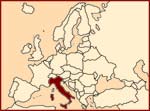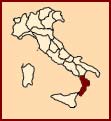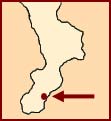|
The archaeological site of the ancient Locri Epizephyrii is
located in Reggio Calabria's province, few kilometres away
from the modern Locri. However it is not the site in which
the first Greek settlers arrived. As a matter of fact, they
first went ashore in the bay adjoining cape Zephyrium (the
ancient denomination of the headland, nowadays called cape
Bruzzano, which is due - as Strabo suggests - to the
Zephyrus, the wind that blows from the west).
Then, after few years, they made for north, starting
the building of the proper city upon the hill known as
Epopis.
The settlers arrived near cape Zephyrium probably because,
as the historical tradition hands down, this was a landing
place commonly used both from merchants and Greek sailors;
the former used it for commercial exchanges with the
natives, while the latter used it as a landing place to
resupply their ships with food and water. Therefore it was a
well-known place for the newcomers Greek settlers.
After setting up their camp near cape Zephyrium, the Greek
settlers began to establish closer relationships with the
natives (Sicels),
drawing up some peace agreements with them. At the same time
they started the exploration of the territories to the north
of cape Zephyrium, discovering very soon that such places
were more suitable for the development of a new polis.
They focused their attention particularly on the coastal
zone below the native camp of Ianchina (today's name of the
zone), much more fertile and rich of water than the hills near cape Zephyrium.
And so they took the decision that the new discovered zone
would have been the definitive site for their settlement.
However, to accomplish their project, the settlers had soon
to breach the agreements previously stipulated with the
natives. And in doing so, according to Polybius'
narration, the Locrians resorted to a trick:
[…] ἦ μὴν εὐνοήσειν αὐτοῖς καὶ κοινῇ τὴν χώραν ἕξειν, ἕως ἂν
ἐπιβαίνωσι τῇ γῇ ταύτῃ καὶ τὰς κεφαλὰς ἐπὶ τοῖς ὤμοις
φορῶσι. τοιούτων δὲ τῶν ὅρκων γινομένων φασὶ τοὺς Λοκροὺς
εἰς μὲν τὰ πέλματα τῶν ὑποδημάτων ἐμβαλόντας γῆν, ἐπὶ δὲ
τοὺς ὤμους σκόρδων κεφαλὰς ἀφανεῖς ὑποθεμένους οὕτως
ποιήσασθαι τοὺς ὅρκους, κἄπειτα τὴν μὲν γῆν ἐκβαλόντας ἐκ
τῶν ὑποδημάτων, τὰς δὲ κεφαλὰς τῶν σκόρδων ἀπορρίψαντας μετ᾽ οὐ
πολὺ καιροῦ παραπεσόντος ἐκβαλεῖν τοὺς Σικελοὺς ἐκ τῆς χώρας.
"(The Locrians
were welcomed by the Sicels provided that) they
would have vowed to share the land with them as long as
they had kept walking on that very same ground and had kept their
heads upon their shoulders. But, as it is said, the Locrians
took the oath after having put some soil in their shoes and
having concealed garlic heads upon their shoulders. After a
while they took the soil away from their shoes, threw the
garlic heads off their shoulders and drove the natives out
of the region."
(Polybius, Histories XII, 6-3)
And so,
in a short time, the natives were defeated and forced to
flee and the Locrian settlers
(we are now between the end of the VIII
century b.C. and the beginning of the VII century b.C.) could
finally start to build their city, 25 km to the north of the site
where they had arrived some years before.
However, in the name of the city remained a reference to the
site of their arrival; as a matter of fact, Oi Lokroi Oi Epizephyrioi
is an ancient Greek plural form that can be translated this way:
The Locrians who live next to the Zephyrium.
|
 |
Locri Epizephyrii is in Italy |
|
 |
In Calabria Region |
|
 |
On the eastern coast of the
Province of Reggio Calabria |
|
|

